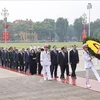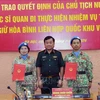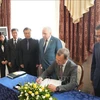The management over motorbike riders should be intensified since they account for more than more than 70 percent of the country’s total road accidents, heard a Hanoi workshop on motor vehicle ownership and use.
The workshop came up with the information found by the World Bank that motorcyclists in Hanoi are less likely to change their habit of using motorbike despite concerns over safety and traffic conditions.
The event was co-organised by the National Committee for Traffic Safety (NCTS), the World Bank (WB) and the Association of Motorbike Manufacturers in Vietnam on November 18.
It aimed to improve safety for Vietnamese motorbike riders with the involvement of researchers, relevant governmental bodies and manufacturers.
Head of the WB’s study mission, David Spice stressed the need to improve awareness of Vietnamese motorbike riders on safe traffic behaviours through education and regulations.
Meanwhile, NCTS Vice President Khuat Viet Hung highlighted the convenience and efficiency of motorbikes in Vietnam, saying that motorbikes would remain the country’s major means of transportation for years to come.
Representatives from ministries and sectors discussed ways to promote safety in urban and suburban traffic while reducing the environmental impact of motor vehicles.
Participants shared their views on solutions, including improving behaviour in the ownership and use of motorbikes, and technical, environmental, and health requirements.
According to the World Bank, the number of motorbike owners in the Southeast Asian countries almost tripled in the 2003-2009 period.
In Vietnam, this means of transportation accounts for more than 85 percent of road vehicles nationwide.
Approximately 95 percent of Vietnamese motorbike riders wear helmets, while only one out of four children under 16 does. NTSC statistics show that 9,000 people die in road accidents every year in Vietnam. During the first 10 months of 2014, road accidents killed 7,000 people and injured many more.-VNA
The workshop came up with the information found by the World Bank that motorcyclists in Hanoi are less likely to change their habit of using motorbike despite concerns over safety and traffic conditions.
The event was co-organised by the National Committee for Traffic Safety (NCTS), the World Bank (WB) and the Association of Motorbike Manufacturers in Vietnam on November 18.
It aimed to improve safety for Vietnamese motorbike riders with the involvement of researchers, relevant governmental bodies and manufacturers.
Head of the WB’s study mission, David Spice stressed the need to improve awareness of Vietnamese motorbike riders on safe traffic behaviours through education and regulations.
Meanwhile, NCTS Vice President Khuat Viet Hung highlighted the convenience and efficiency of motorbikes in Vietnam, saying that motorbikes would remain the country’s major means of transportation for years to come.
Representatives from ministries and sectors discussed ways to promote safety in urban and suburban traffic while reducing the environmental impact of motor vehicles.
Participants shared their views on solutions, including improving behaviour in the ownership and use of motorbikes, and technical, environmental, and health requirements.
According to the World Bank, the number of motorbike owners in the Southeast Asian countries almost tripled in the 2003-2009 period.
In Vietnam, this means of transportation accounts for more than 85 percent of road vehicles nationwide.
Approximately 95 percent of Vietnamese motorbike riders wear helmets, while only one out of four children under 16 does. NTSC statistics show that 9,000 people die in road accidents every year in Vietnam. During the first 10 months of 2014, road accidents killed 7,000 people and injured many more.-VNA



















